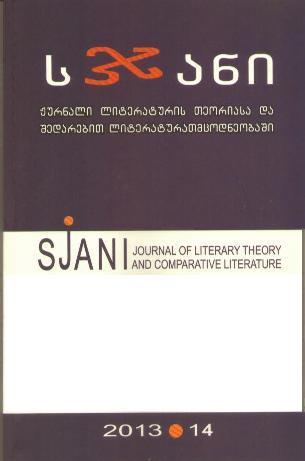ქართული ლიტერატურის თარგმანი ბულგარულ და რუსულ ენებზე: ბულგარელი რუსისტის შენიშვნები
On the Translation of Georgian Literature into Bulgarian and into Russian: Introductory Notes by a Bulgarian Russianist
Author(s): Yordan LyutskanovSubject(s): Literary Texts
Published by: ლიტერატურის ინსტიტუტის გამომცემლობა
Keywords: Post-colonial situation in the Black sea region; intercultural stereotypes; post- Byzantine commonwealth; Bulgarian-Georgian literary contact; Shota Rustaveli; Nikoloz Baratashvili.
Summary/Abstract: On the Translation of Georgian Literature into Bulgarian and into Russian: Introductory Notes by a Bulgarian Russianist Summary Key words: Post-colonial situation in the Black sea region, intercultural stereotypes, post- Byzantine commonwealth, Bulgarian-Georgian literary contact,; Shota Rustaveli, Nikoloz Baratashvili. This paper has a pragmatic task which is no less important than its scholarly, or semantic, task proper. It is to outline and to try basic parameters of possible Bulgarian-Georgian understanding each other in humanities, in a probably doubly postcolonial situation. Doubly postcolonial, that is: post-Soviet and post-Eurocentric. The task is complicated given our ambition to focus on ‘understanding each other’ not on ethereal but on Bulgarian- Georgian matters. The ‘matter’ to be understood penetrates the understanding agent. Trying to cope with this pragmatic task, we guess, has resulted in paradoxical implicitness of some of the paper’s theoretic preconceptions (while others have been certainly overemphasised) and the arbitrary pretension of comprehensiveness of some of the explanations. The narrowly scholarly task of this paper is to make an overview of the translations of Georgian literature in modern Bulgaria. Their general dependence from the mediation Йордан Люцканов 239 of the Russian language and the Russian Soviet culture becomes apparent, but whether certain breakthroughs or a steady deviation from a Russian-Soviet norm had taken place remains to be acknowledged. One should normally expect such breakthroughs or deviation in cases of direct Georgian-Bulgarian translation, but the situation appears to be more complex. As a preparation for a less extensive study, to be focused on analysing particular Georgian-Bulgarian translations and on comparing them with corresponding Georgian- Russian ones, we attend to two issues: the issue of “Vepkhistkaosani’s” title in Russian (and Bulgarian) renderings (sporadically compared to English, Polish, German, French, Italian, Spanish and Hungarian ones) and the issue of Nikoloz Baratashvili’s “Cup” or “Crater” translated into Bulgarian and into Russian. The translation of “Vepkhistkaosani” was performed from the Georgian (the translator Stojan Bakŭrdzhiev seems to have relied on a literal translation but the latter’s author is unknown) yet the first acquaintance with the final result encounters strong Russian-Soviet impact on it. The translations of Baratashvili’s works are less unequivocal in this regard. We argue that the standard Soviet translation of Rustaveli’s work title, “Vitjaz’ v tigrovoj shkure”, instructs the reader for what we consider an inadequate reading which deprives the work from its non-laic significance and its intertextual aura and which misleads in assessing the work’s genre and poetics.
Journal: სჯანი
- Issue Year: 2013
- Issue No: 14
- Page Range: 206-241
- Page Count: 35
- Language: Russian

